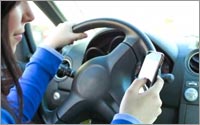 The auto companies may
be moving a bit too fast for the American public when it comes to putting connectivity into their cars.
The auto companies may
be moving a bit too fast for the American public when it comes to putting connectivity into their cars.
According to a new Harris Poll, more than three-quarters (76%) of
Americans think in-car connectivity technology (including mobile devices that connect to the Internet, navigation systems, emergency response systems and driving-habit monitoring devices) is
distracting and could be dangerous. More than half (55%) believe the automakers have already taken the technology too far.
Beyond the concerns about distracted driving, nearly
two-thirds of car owners had privacy concerns about the technology tracking where and how they drive. Two-fifths (41%) believed their insurance rates could go up because of what the technology reveals
about their driving habits; the concerns increased among younger drivers and men.
advertisement
advertisement
As one might expect, the difference in attitudes about in-car connectivity falls along generational
lines. Baby Boomers put a much lesser importance on connectivity (only 39% of owners 50-66 find it to be an important feature) than Millennials (58% of owners 18-35 felt it was important). In fact,
among younger buyers, two-thirds (66%) said the technology available in a vehicle has some or a great deal of influence on their car choice, while only 46% of Baby Boomers feel the same way.
“Car makers should take note; depending on the generation of their target market, in-car connectivity can have influence on the buying decision, but too much of a good thing may
just be too much,” said Mike Chadsey, vice president, automotive solutions consultant for Harris Interactive, in a statement. “Ultimately, when it comes to marrying technology with their
car, consumers want it to be both safe and in a way that they can control.”